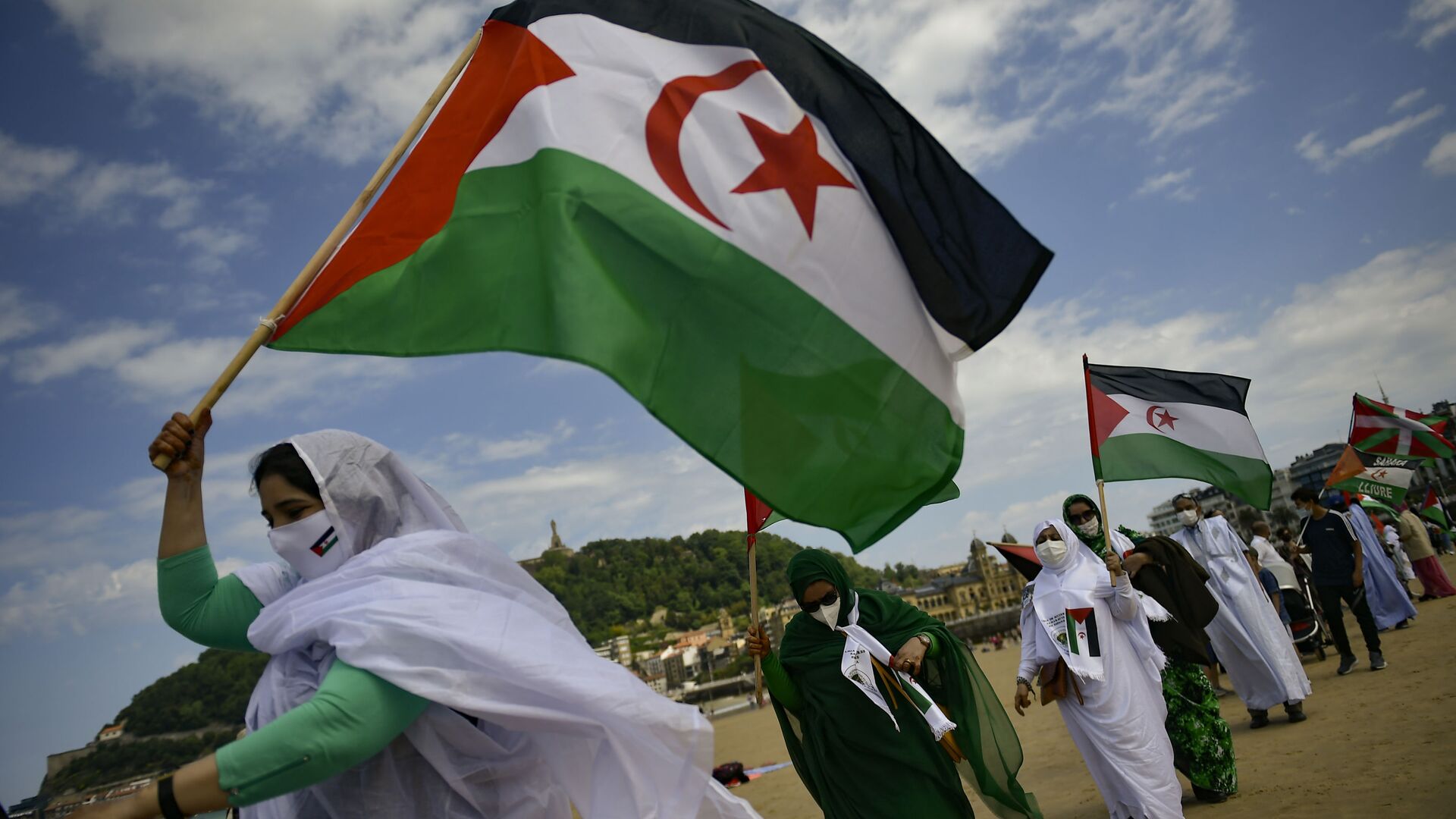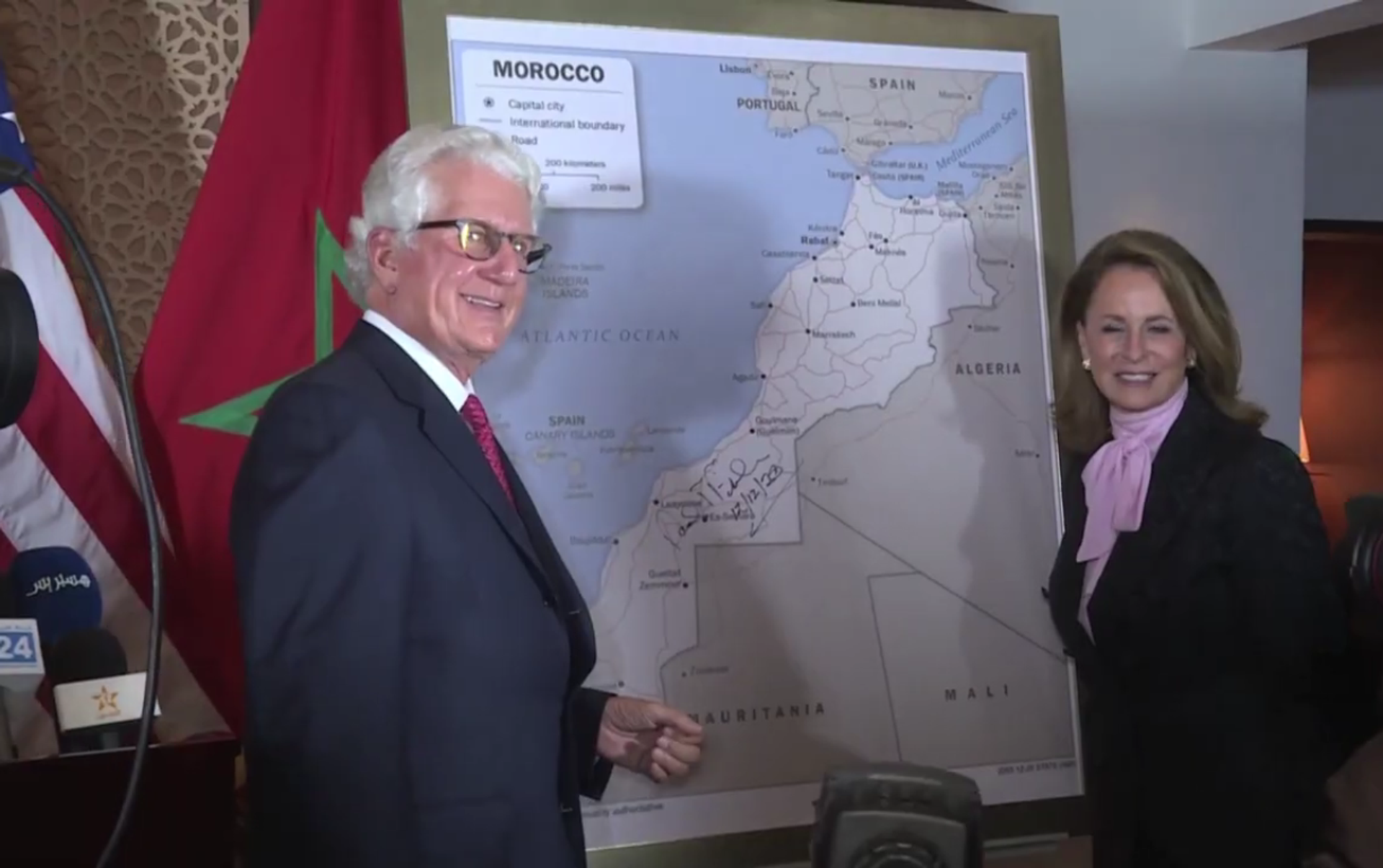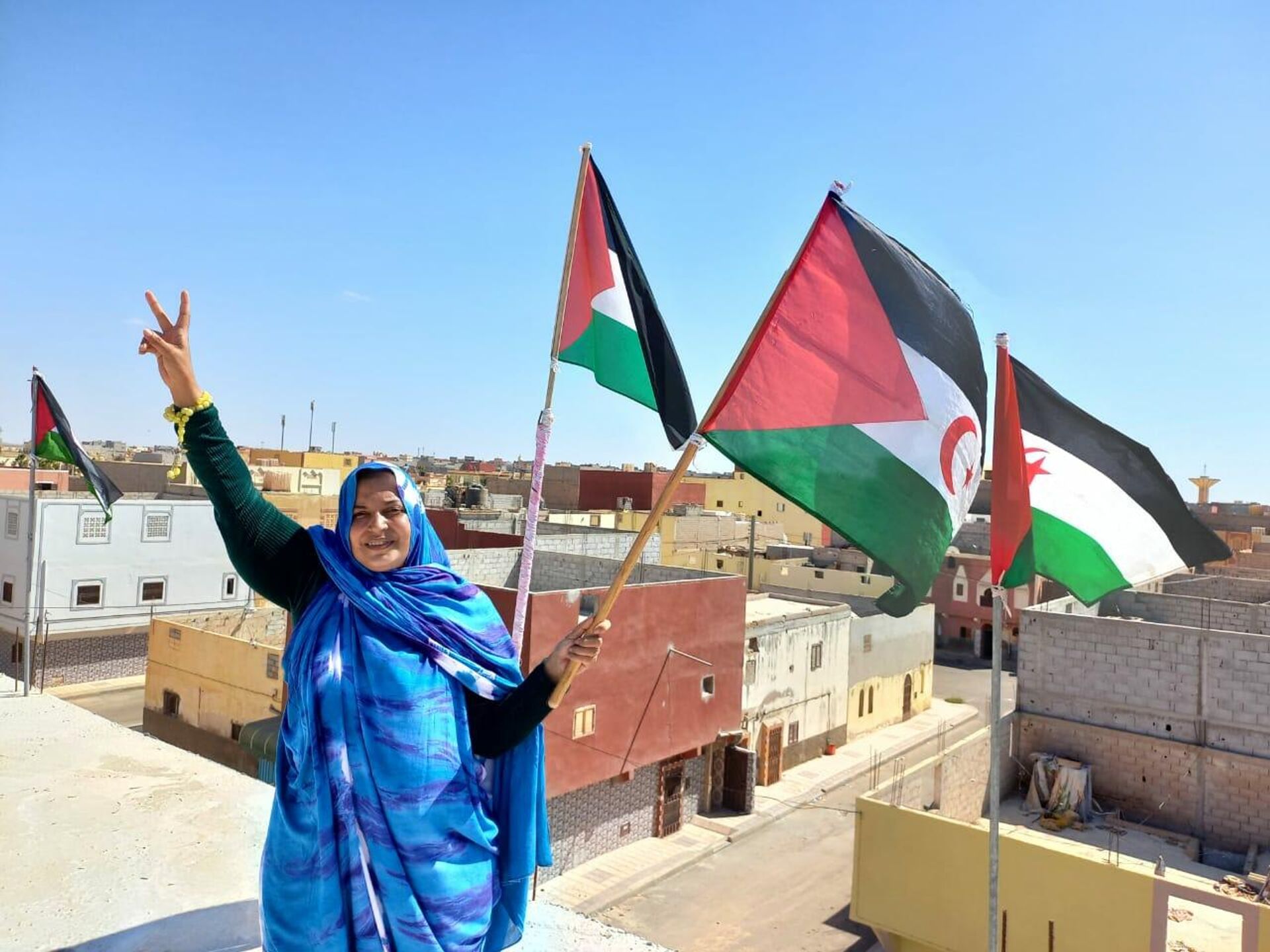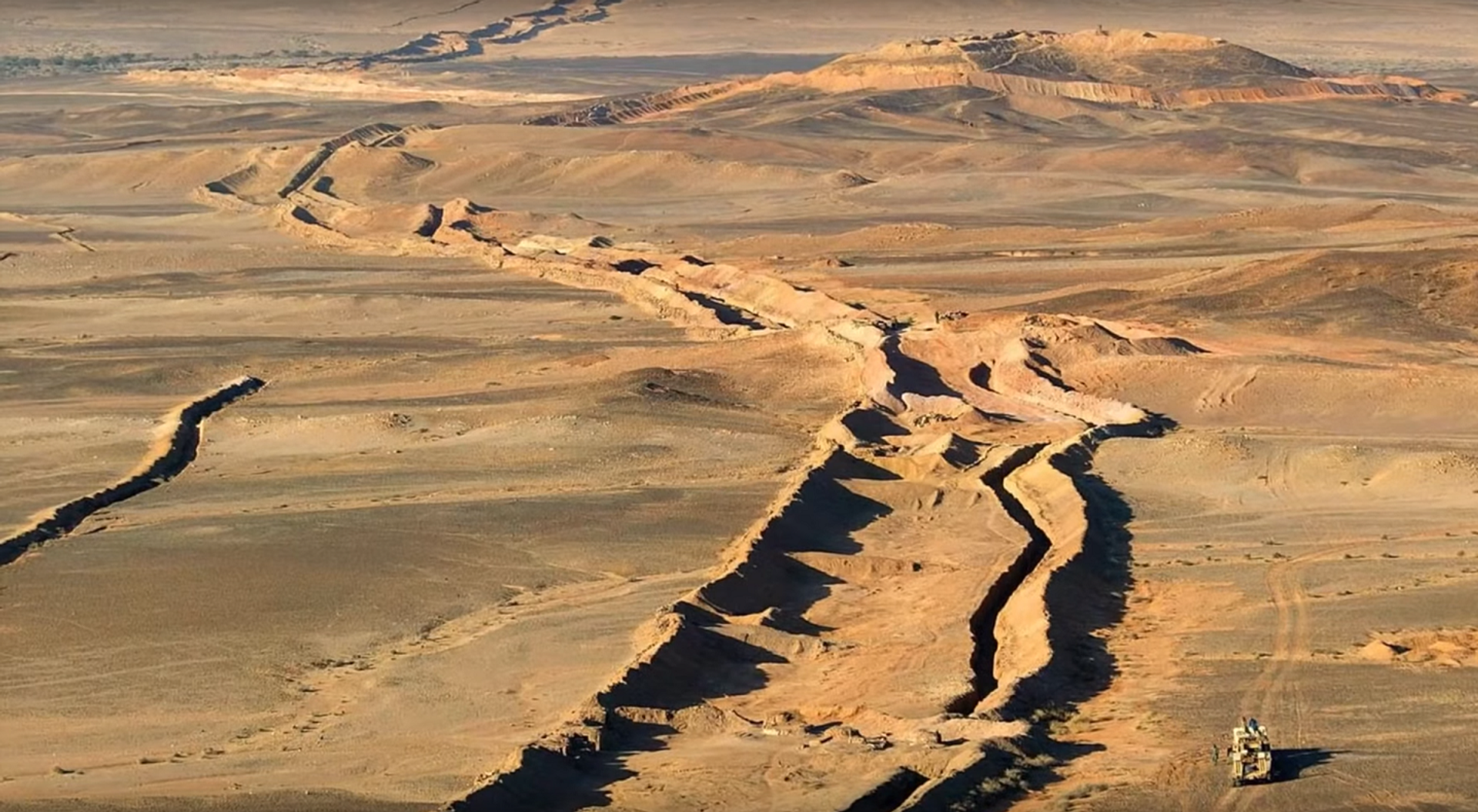https://sputnikglobe.com/20220803/saharawi-human-rights-report-warns-of-dramatic-increase-in-moroccan-abuses-since-2020-war-outbreak-1098088326.html
Saharawi Human Rights Report Warns of ‘Dramatic Increase’ in Moroccan Abuses Since 2020 War Outbreak
Saharawi Human Rights Report Warns of ‘Dramatic Increase’ in Moroccan Abuses Since 2020 War Outbreak
Sputnik International
US President Joe Biden has refused to change course on Morocco and Western Sahara, with US Deputy Secretary of State Wendy Sherman telling reporters in March... 03.08.2022, Sputnik International
2022-08-03T20:40+0000
2022-08-03T20:40+0000
2022-08-03T20:40+0000
western sahara
un mission for the referendum in western sahara (minurso)
morocco
human rights
war
https://cdn1.img.sputnikglobe.com/img/07e5/06/0f/1083156521_0:160:3073:1888_1920x0_80_0_0_6d23a5759aaff904fbef19227a8866b8.jpg
A new report by a Saharawi human rights group draws attention to the dearth of human rights protections in Western Sahara, a territory ruled by Morocco and claimed as its own, and the “dramatic increase” in abuses since war returned to the region in late 2020.According to the report, when hostilities between the Saharawi Polisario Front and Moroccan forces erupted in November 2020 after a 29-year ceasefire, the repression sharply increased - a dynamic Sputnik has previously documented.“Morocco breached the ceasefire and annexed additional territories because they were encouraged by Trump to do so,” he explained. “The unclear position of Biden’s administration can be also received as ‘turning a blind eye’ to the ongoing crimes against humanity, and that is why we have documented a dramatic increase in brutality from the Moroccan occupation forces.”In December 2020, then-US President Donald Trump recognized Morocco’s longstanding claims of sovereignty over Western Sahara as part of a deal to get Rabat to normalize relations with Israel - the fourth Arab nation to do so that year. However, since 1991, the United Nations has promised a referendum on independence in Western Sahara - the product of 16 years of war against Moroccan occupation by the Polisario Front, which was recognized as the legitimate representatives of the Saharawi people. Before 1975, Western Sahara was a Spanish colony, and when Spanish forces left, Rabat seized the territory.One such person, Sultana Khaya, who is head of the group “League for the Defence of Human Rights and against Plunder of Natural Resources,” arrived in Spain for medical treatment in June after enduring more than 500 days of siege in her home by Moroccan security forces. Khaya endured regular break-ins to her home by police, beatings, and sexual assault, and she had her electricity cut off and sewage thrown into her home.A report published a day prior by Human Rights Watch titled “They’ll Get You No Matter What: Morocco’s Playbook to Crush Dissent,” documented some of the same dynamics specifically targeting activists and journalists, calling them “an ecosystem of repression.”CODESA concluded by noting the “failure of the United Nations to complete the decolonization process in Western Sahara and the failure of the UN Security Council to bear its responsibilities, notably in activating the International Committee of the Red Cross and ensuring that the United Nations Mission for the Organization of the Referendum in Western Sahara (MINURSO) has a human rights mandate.“It goes on to note that “The same conclusion was affirmed inter alia by the report of the Office of the UN High Commissioner for Human Rights as early as 2006 and international parliamentary groups and human rights organizations have regularly denounced this situation.”"We continue to view Morocco's autonomy plan as serious, credible and realistic," US Deputy Secretary of State Wendy Sherman told reporters during a March 8 presser in Rabat with Moroccan Foreign Minister Nasser Bourita.
western sahara
morocco
Sputnik International
feedback@sputniknews.com
+74956456601
MIA „Rossiya Segodnya“
2022
Sputnik International
feedback@sputniknews.com
+74956456601
MIA „Rossiya Segodnya“
News
en_EN
Sputnik International
feedback@sputniknews.com
+74956456601
MIA „Rossiya Segodnya“
Sputnik International
feedback@sputniknews.com
+74956456601
MIA „Rossiya Segodnya“
western sahara, un mission for the referendum in western sahara (minurso), morocco, human rights, war
western sahara, un mission for the referendum in western sahara (minurso), morocco, human rights, war
Saharawi Human Rights Report Warns of ‘Dramatic Increase’ in Moroccan Abuses Since 2020 War Outbreak
US President Joe Biden has refused to change course on Morocco and Western Sahara, with US Deputy Secretary of State Wendy Sherman telling reporters in March that the US “view[s] Morocco's autonomy plan” in the non-self-governing territory “as serious, credible and realistic," despite longstanding UN resolutions calling for a referendum.
A new report by a Saharawi human rights group draws attention to the dearth of human rights protections in Western Sahara, a territory ruled by Morocco and claimed as its own, and the “dramatic increase” in abuses since war returned to the region in late 2020.
The report by the Collective of Saharawi Human Rights Defenders in Western Sahara (CODESA) was issued on July 28 and is titled “Continuous war crimes and crimes against humanity by the Moroccan occupation against Saharawi civilians. What future for the decolonization process in Western Sahara?” The report covers the years 2020 and 2021.
According to the report, when hostilities between the Saharawi Polisario Front and Moroccan forces erupted in November 2020 after a 29-year ceasefire, the repression sharply increased - a dynamic
Sputnik has previously documented.
“The political cover provided to the Moroccan occupation by countries who claim to defend international law and human rights, such as the
United States and Spain, and international institutions such as the EU, is directly endangering the lives of Saharawi civilians in Western Sahara,” Mahjoub Maliha, head of external relations at CODESA, told Sputnik on Wednesday.
“Morocco breached the ceasefire and annexed additional territories because they were encouraged by Trump to do so,” he explained. “The unclear position of Biden’s administration can be also received as ‘turning a blind eye’ to the ongoing crimes against humanity, and that is why we have documented a dramatic increase in brutality from the Moroccan occupation forces.”
In December 2020, then-US President Donald
Trump recognized Morocco’s longstanding claims of sovereignty over Western Sahara as part of a deal to get Rabat to
normalize relations with Israel - the fourth Arab nation to do so that year. However, since 1991, the United Nations has promised a referendum on independence in Western Sahara - the product of 16 years of war against Moroccan occupation by the Polisario Front, which was recognized as the
legitimate representatives of the Saharawi people. Before 1975, Western Sahara was a Spanish colony, and when Spanish forces left, Rabat seized the territory.
Across the years 2020 and 2021, CODESA documented 20 extrajudicial killings of Saharawis; 264 violations of the right to physical integrity; 121 kidnappings and arbitrary detentions; 139 home sieges; 205 violations of their right to freedom of expression and assembly; and 195 restrictions on their freedom of movement, according to an executive summary of the report provided to Sputnik.
One such person, Sultana Khaya, who is head of the group “League for the Defence of Human Rights and against Plunder of Natural Resources,”
arrived in Spain for medical treatment in June after enduring
more than 500 days of siege in her home by Moroccan security forces. Khaya endured regular break-ins to her home by police, beatings, and sexual assault, and she had her electricity cut off and sewage thrown into her home.
CODESA also recorded 59 instances of hunger strikes; 43 cases of prisoners being prevented from making outside contact; 43 cases of mistreatment; and 41 times prisoners were denied medical assistance. The largest number of these happened at Ait Melloul prison, located in the Moroccan city 650 kilometers north of the border. According to CODESA, 24.4% of Saharawi political prisoners are held there - the most of the nine prisons mentioned in the report.
A report published a day prior by
Human Rights Watch titled “They’ll Get You No Matter What: Morocco’s Playbook to Crush Dissent,” documented some of the same dynamics specifically targeting activists and journalists, calling them “an ecosystem of repression.”
“Authorities use a playbook of underhanded tactics to repress dissenters while striving to keep intact Morocco’s image as a rights-respecting country,” Lama Fakih, HRW’s Middle East and North Africa director,
said in a news release. “The international community should open its eyes, see the repression for what it is, and demand that it stops.”
CODESA concluded by noting the “failure of the United Nations to complete the decolonization process in Western Sahara and the failure of the UN Security Council to bear its responsibilities, notably in activating the International Committee of the Red Cross and ensuring that the United Nations Mission for the Organization of the Referendum in Western Sahara (MINURSO) has a human rights mandate.“
“As long as the United Nations and its bodies remain incapable of decolonizing Western Sahara and protecting Saharawi civilians and ultimately of upholding the fundamental right of the Saharawi people to self-determination, the Moroccan occupation forces will continue their multiple forms of systematic repression, war crimes and crimes against humanity and their brutal abuse against human rights defenders and Saharawi civilians,” the report states.
It goes on to note that “The same conclusion was affirmed inter alia by the report of the Office of the UN High Commissioner for Human Rights as early as 2006 and international parliamentary groups and human rights organizations have regularly denounced this situation.”
Speaking to Morocco’s ambassador to Russia, Lotfi Bouchaara, in April, Russian Deputy Foreign Minister
Sergey Vershinin said the “achievement of a just and sustainable solution to this long-standing problem [of peace in Western Sahara] is possible only by political means on the basis of the relevant resolutions of the UN Security Council.”
"We continue to view Morocco's autonomy plan as serious, credible and realistic," US Deputy Secretary of State Wendy Sherman told reporters during a March 8 presser in Rabat with Moroccan Foreign Minister Nasser Bourita.




